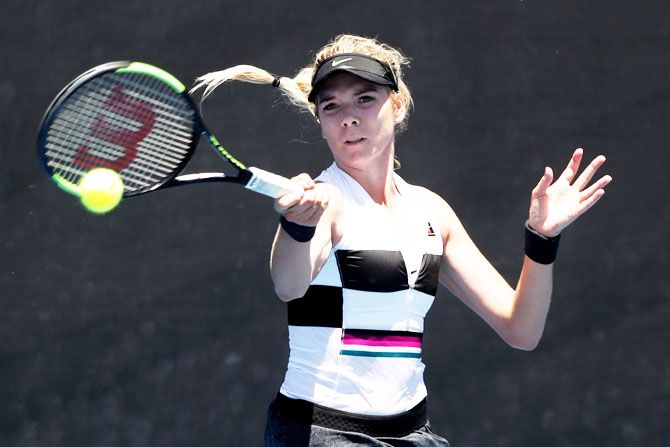Wins match in deciding set-shootout after premature celebration.
The Briton, who overcame dual Grand Slam semi-finalist Ekaterina Makarova, thought she had won the first round match after reaching seven points in the third set tiebreak and celebrated accordingly.

Katie Boulter became the first player to win a main draw match at the Australian Open under a revamped scoring system on Monday but not before losing her way during the new-look deciding set shootout.
The Briton, who overcame dual Grand Slam semi-finalist Ekaterina Makarova, thought she had won the first round match after reaching seven points in the third set tiebreak and celebrated accordingly.
Reminded the tie-break was an extended first-to-ten-points affair, the 22-year-old regrouped, won it 10-6 and was later able to see the funny side.
"I was in the moment and I kind of forgot that it was first to 10 but I'm happy I could dig deep and get through it in the end," said Boulter, who plays eleventh seed Aryna Sabalenka of Belarus, in the second round.
"I've got to take it light-heartedly. I ended up getting the win, I probably would have been really devastated had I not."
Watch: Katie Boulter's premature celebration during her first round win against Ekatarina Makarova at the Australian Open. Video: Kind courtesy, Aus Open/Twitter
She retweeted a video clip posted by Australian Open's official handle and posted 'whoopsy'.
Australian Daria Gavrilova also found it funny and retweeted the video writing: 'Hahaha I knew someone would do it'.
While Boulter was the first player to win a first-to-ten-point tiebreak in the main draw, several tight qualifying matches already tested out the format.
Scoring systems have been hotly debated ever since the so-called "endless match" between John Isner and Nicolas Mahut at Wimbledon in 2010, which ended after the American prevailed 70-68 in the fifth set after more than eight hours.
The debate reignited last year after Isner was again involved in an ultra-long match at Wimbledon, losing 26-24 in the deciding set to South Africa's Kevin Anderson in the semi-finals.
On both occasions, the exhausted winner of the marathon contest lost their next match.
The lengthy contests also wreaked havoc with timetabling, shunting subsequent matches onto other courts, as well as the all-important television schedules.
Each of the Grand Slams now utilise a different system for deciding deadlocked matches.
The US Open and Australian Open both use tiebreaks when scores are locked at six games apiece in the deciding set, although the length of the final set tiebreak differs.
Wimbledon will this year utilise a tiebreak should scores get locked at 12 games each in the decider.
This has left the French Open the sole major with the potential for an interminable match, where a player must secure a two-game advantage in the deciding set instead of engaging in a shoot-out.














 © 2025
© 2025